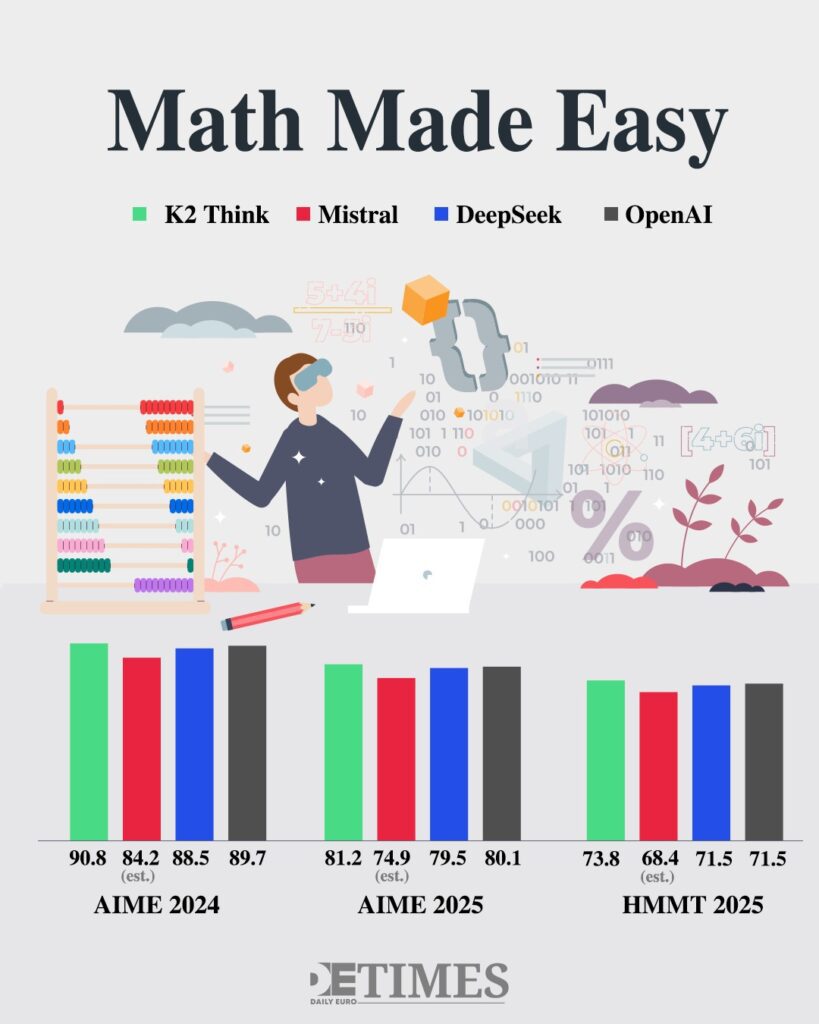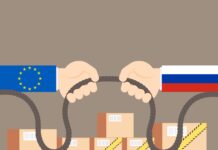Abu Dhabi pulled off something unexpected last week. The UAE’s Mohamed bin Zayed University of Artificial Intelligence unveiled K2 Think, an open-source AI model that beat France’s Mistral on math problems.
On benchmark evaluations, K2 Think leads all other open-source models in competitive math performance. It scored 90.8 on AIME 2024, 81.2 on AIME 2025, and 73.8 on HMMT 2025.
For a country that most people still think runs entirely on oil money, this caught everyone off guard.
Money Talks, But Smart Money Wins
The UAE played this differently than Europe did. France’s Mistral raised €600 million in June through the usual venture capital routine. Abu Dhabi went another route entirely. They built universities and research labs over years, then partnered with G42, which has Microsoft money behind it.
With 32 billion parameters, it matches the reasoning power of OpenAI and DeepSeek’s models that operate at more than 120 billion parameters. That means K2 Think does the same job with much less computing power. In an industry where electricity bills can break companies, this matters.
The emirate also made K2 Think completely open-source when it launched. Anyone can download the code and tinker with it. European companies keep wrestling with whether to share their work or guard it jealously.
France’s AI Bet Looks Shakier Now
France has been talking up Mistral as Europe’s answer to American AI dominance. The company just pulled in another €1.7 billion, putting its value at €11.7 billion. That makes it one of Europe’s most expensive tech companies. But K2 Think outperforms Mistral while using less computer power.
French officials bet big on Mistral becoming a national champion. Now they have to explain how a small Gulf state built something better with less fanfare. Meanwhile, the UAE keeps hiring top engineers from Boston and London while European companies get tangled up in new regulations.
At the same time, deals keep popping up between UAE money and European firms. MGX, an Abu Dhabi investment fund, just agreed to help build Europe’s biggest AI campus in France. The lines between competition and cooperation keep getting blurrier.

Small Beats Big in the New Math
K2 Think proves you don’t need the biggest computer to win anymore. The model runs circles around systems that cost hundreds of millions while barely breaking a sweat. This changes everything for smaller companies and poorer countries that got locked out of the AI game by sky-high costs.
Cheap models could flip the whole industry upside down. Owning the most expensive computers won’t save you if someone else figures out how to do the same job for a tenth the price. Companies that master efficiency instead of just buying more servers might end up running the show.
Strange Bedfellows in the Desert
Gulf countries keep making deals with European partners even as they compete. MGX’s partnership with France shows how tangled these relationships have become. UAE money will help build European AI infrastructure, which might then compete with UAE models.
Both sides get something out of these arrangements. Europe gets patient investment money that doesn’t demand quick profits. The UAE gets access to European universities and their research networks. Old ideas about countries competing in separate tech blocs don’t make much sense anymore.
Countries that want to stay relevant in AI need real plans, not just press releases. The UAE spent years building institutions before anyone paid attention to their AI work.
European politicians might want to study that playbook instead of making grand announcements that fizzle out after the cameras leave.
The UAE just proved that a country with 10 million people can outbuild tech powers with 10 times the population. Other nations watching this unfold should ask themselves: what exactly are we doing with our money?
Keep up with Daily Euro Times for more updates!
Read also:
AI Startup Breakthrough: France and UAE Talk the Talk with Le Chat
AI and Journalism: Writing Still Belongs to the Author
Cyber Warfare Hits DeepSeek: Is AI Ever Secure?






